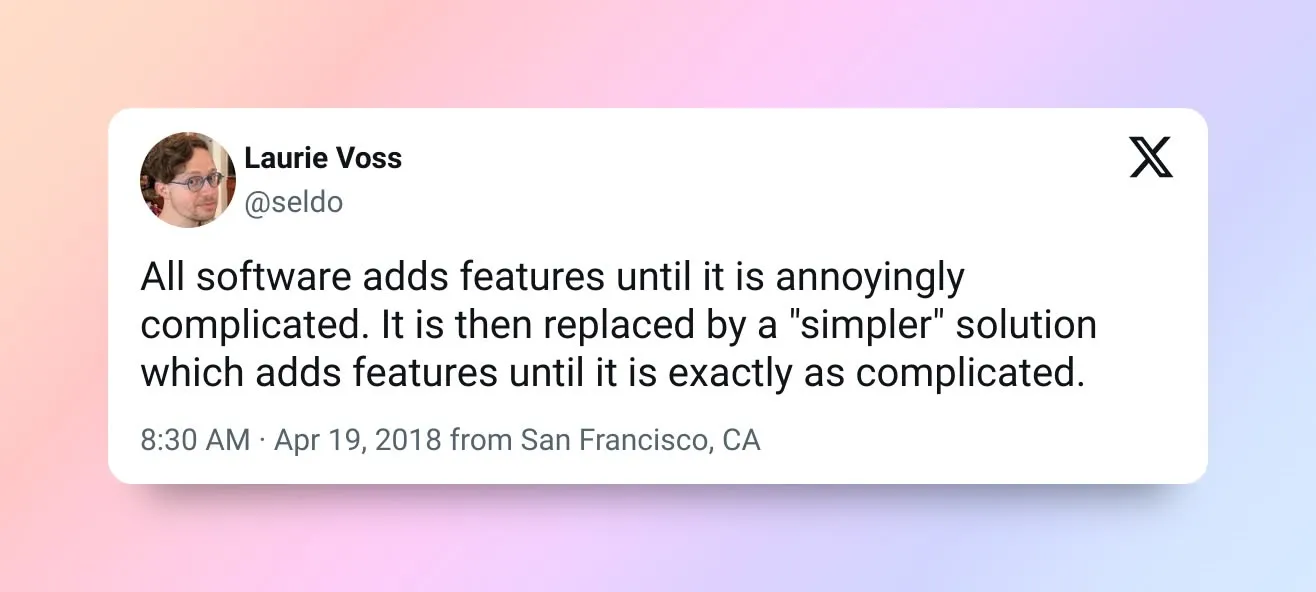I’ve spent years watching smart engineers and marketers fall into the same trap at tech companies. They keep polishing the same project forever, convinced they’re crushing it… while their managers wonder why nothing ever gets finished.
Here’s the hard truth I learned: "getting things done" at tech companies isn’t what you think it is. 🤔
Table of contents
Open Table of contents
The software entropy principle
Software engineers face a unique paradox: our work is simultaneously never complete and yet must be completed. Unlike physical products with clear manufacturing endpoints, digital products exist in a state of perpetual potential improvement.
At one of my previous jobs, a senior engineer once told me, “The most valuable skill I’ve developed isn’t coding—it’s knowing when to stop coding.” He explained how earlier in his career, he’d lost months to perfecting systems that were already solving the business problem, missing opportunities to make impact elsewhere. He felt he had something to prove but when he looked back no one cared or noticed.
The task treadmill illusion
Many engineers mistake motion for progress, falling into what I call the "task treadmill illusion." You’re running fast, checking off tasks, feeling the burn of productivity - but you’re not actually getting anywhere new. I’ve even fallen into this myself.
I experienced this firsthand leading a frontend team. We’d successfully launched a new ecommerce website for an interal parnter team, but instead of moving on to new challenges, I had an engineer that kept refining components that were already working perfectly. 1 He created increasingly elaborate documentation, made his code exceptionally readable added edge case handling for scenarios no user would encounter, and debated pixel-perfect spacing. From his perspective, he was being an incredible stewards of quality. From the company perspective, he was stuck polishing what was already shiny while new opportunities passed by.
The feature creep monster
This expansion tendency isn’t just about optimization - it’s about scope too. As programmer Jamie Zawinski famously observed:
Every program attempts to expand until it can read mail. Those programs which cannot so expand are replaced by ones that can.2
This is especially true in the AI-era! 🤖 It’s so easy now to add chatbots everywhere, turning your sleek product into a bloated monster. Maybe it’s actually okay that your customers still handle their meeting notes in Google Docs… not everything needs to live inside your product.

The cost
This is precisely how feature creep happens. You pile on “cool stuff” until your product becomes more bloated than my fantasy baseball roster. Then BOOM - users can’t find the basic features they signed up for. And those poor new users? Completely lost in your feature labyrinth, clicking around like rookies setting up their first security config. Then they all complain on your NPS score screaming and praying for you to focus on the UI and stop added AI that none of them know how to use.
The cruel irony? Each individual feature addition seemed reasonable and valuable when viewed in isolation. It’s their cumulative effect that creates the monster.
What “done” actually means in tech companies
After watching countless projects succeed or fail, I’ve realized that “getting things done” in tech companies means two specific things (and no, goals aren’t the same as strategy):
FINISHING Things(Even When They Could Be Better) The key insight: “done” means getting your work to a point where decision-makers are happy, then walking away. I’ve watched brilliant engineers keep tweaking and refactoring long after their project stopped being seen as successful and started being viewed as a waste of resources. Meanwhile, their colleagues who shipped two more things in that time got promoted.Making Your Work LEGIBLEto Decision-Makers Your work needs to be visible and understandable to your manager and 1-3 skip levels (depending on your role). The easiest approach is working on:
- Projects they specifically requested
- High-visibility incidents they’re involved in 3
- Work with clear financial impact (revenue generated or costs saved)
Here’s the uncomfortable truth: to most executives, your technical work is indistinguishable from gibberish. They genuinely cannot tell whether you’re creating revolutionary systems or just moving code around like furniture. Is it any wonder AI initiatives get such enthusiastic executive support? The logic is painfully straightforward: ‘If all this technical stuff is magic to me anyway, why not just have the cheaper, faster AI magician do it?’ Making your work legible isn’t just about recognition—it might be about job security.
Why this definition matters (even if you hate it)
This definition of “getting things done” might feel frustrating. You might be thinking: “Shouldn’t there be something more concrete than making people happy?”
But social constructs shape our reality in profound ways. They’re not just abstract concepts – they organize our work lives and determine what gets valued.
The interesting thing about these social agreements is how real their consequences are. Your understanding of “getting things done” directly impacts your career trajectory, your compensation, and even your job security.
The most effective engineers (or any worker) recognize that while they can debate the definition all day, it’s more practical to align their work with how success is actually measured in their organization. They learn to ship, ensure visibility, and move on to create new value elsewhere.
Links
Getting Things “Done” in Large Tech Companies - The article that inspired this post.